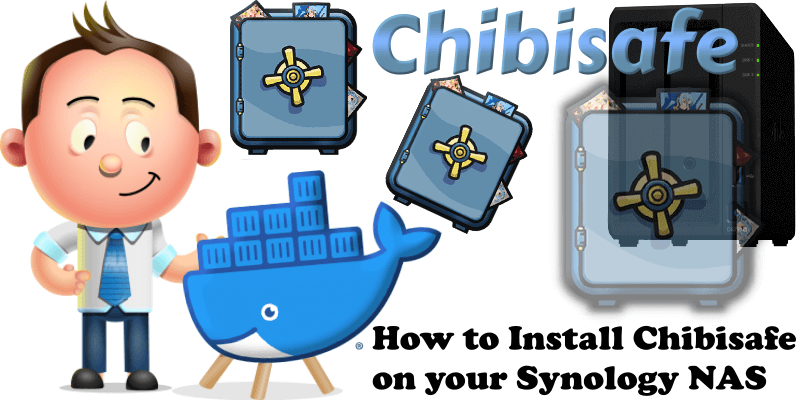
Chibisafe is a file uploader service written in node that aims to be easy to use and easy to set up. It’s easy to use, easy to deploy, free and open source. It accepts files, photos, documents, anything you imagine and gives you back a shareable link for you to send to others. Chibisafe supports both public and private mode. Public mode lets anyone sign up and start uploading files to the service, whereas in private mode only users with an invite link can do so. During upload, if the file is big, it’s automatically split into chunks to minimize the chance of network failures, enabling you to retry each chunk up to 5 times. Users can also create an API key to use with 3rd party applications to interact directly with their account. In this step by step guide I will show you how to install Chibisafe on your Synology NAS using Docker & Portainer.
This guide works perfectly with the latest Chibisafe v6.5.4 release.
STEP 1
Please Support My work by Making a Donation.
STEP 2
Install Portainer using my step by step guide. If you already have Portainer installed on your Synology NAS, skip this STEP. Attention: Make sure you have installed the latest Portainer version.
STEP 3
Make sure you have a synology.me Wildcard Certificate. Follow my guide to get a Wildcard Certificate. If you already have a synology.me Wildcard certificate, skip this STEP.
STEP 4
Go to Control Panel / Login Portal / Advanced Tab / click Reverse Proxy. Follow the instructions in the image below.
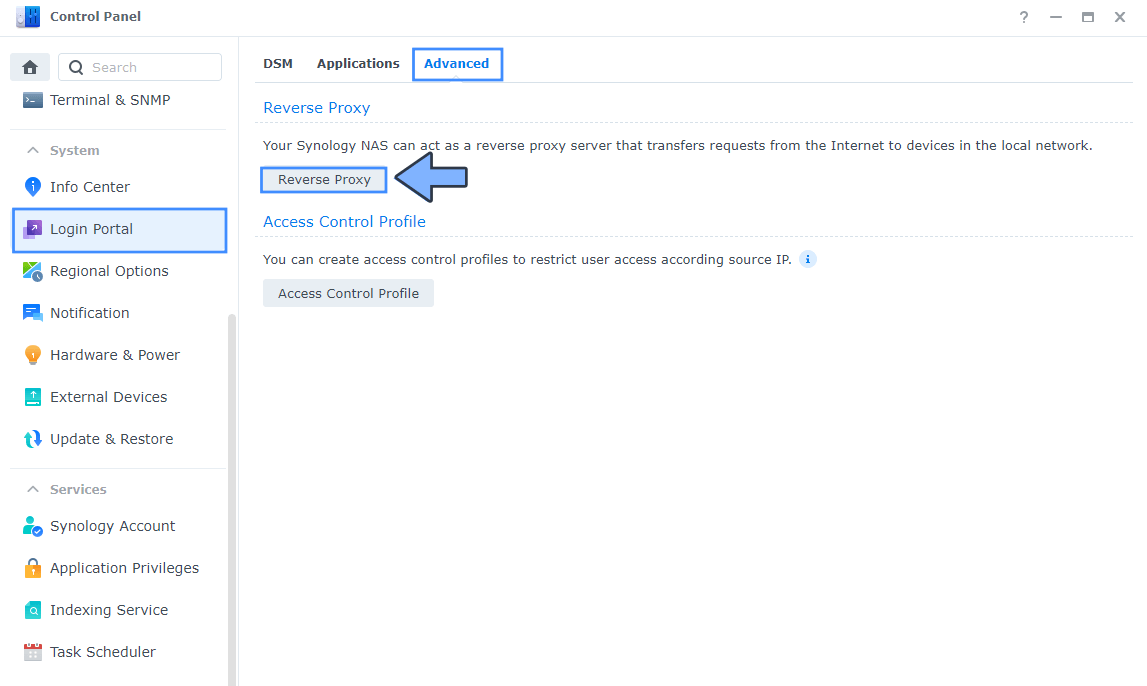
STEP 5
Now click the “Create” button. Follow the instructions in the image below.
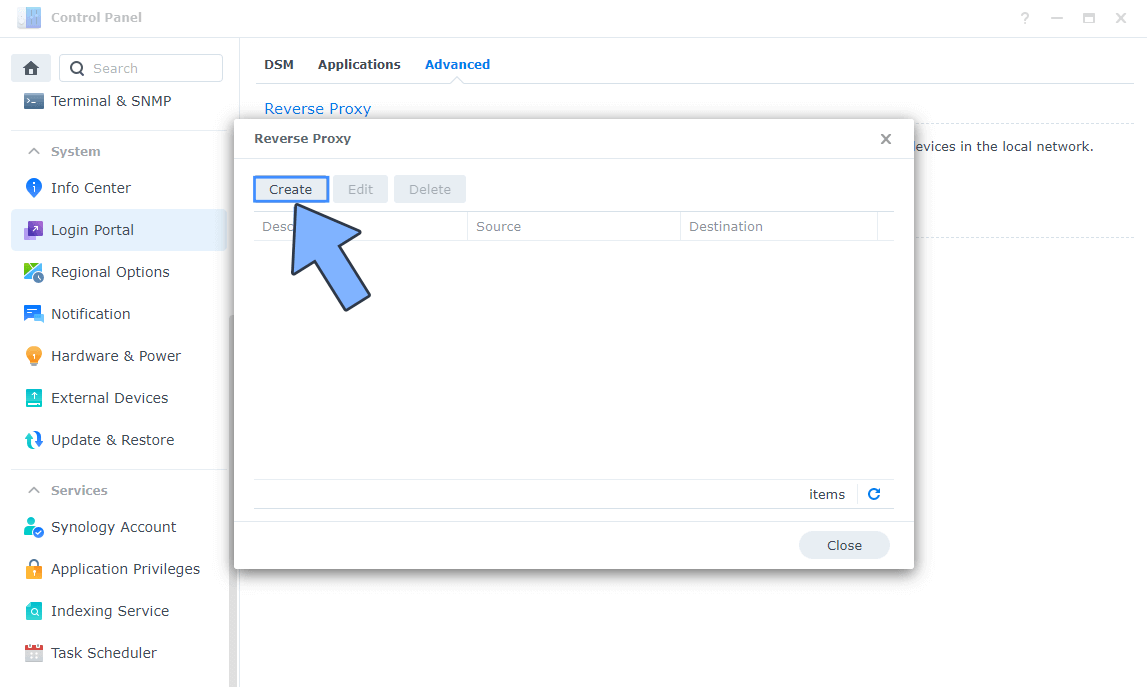
STEP 6
After you click the Create button, the window below will open. Follow the instructions in the image below.
On the General area, set the Reverse Proxy Name description: type in Chibisafe. After that, add the following instructions:
Source:
Protocol: HTTPS
Hostname: chibisafe.yourname.synology.me
Port: 443
Check Enable HSTS
Destination:
Protocol: HTTP
Hostname: localhost
Port: 2425
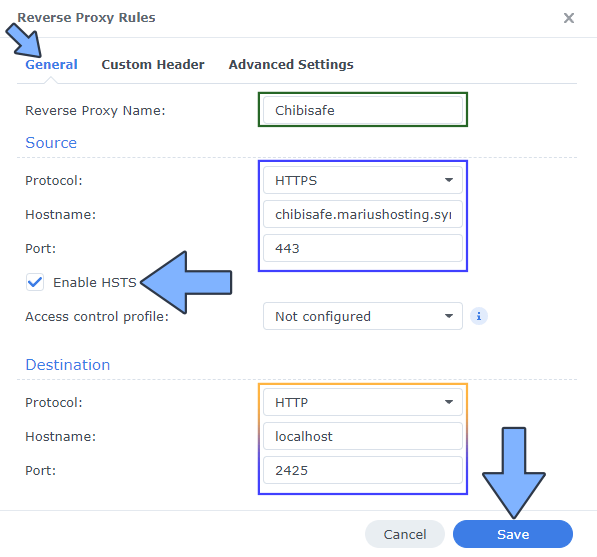
STEP 7
On the Reverse Proxy Rules click the Custom Header tab. Click Create and then, from the drop-down menu, click WebSocket. After you click on WebSocket, two Header Names and two Values will be automatically added. Click Save. Follow the instructions in the image below.

STEP 8
Go to Control Panel / Network / Connectivity tab/ Check Enable HTTP/2 then click Apply. Follow the instructions in the image below.
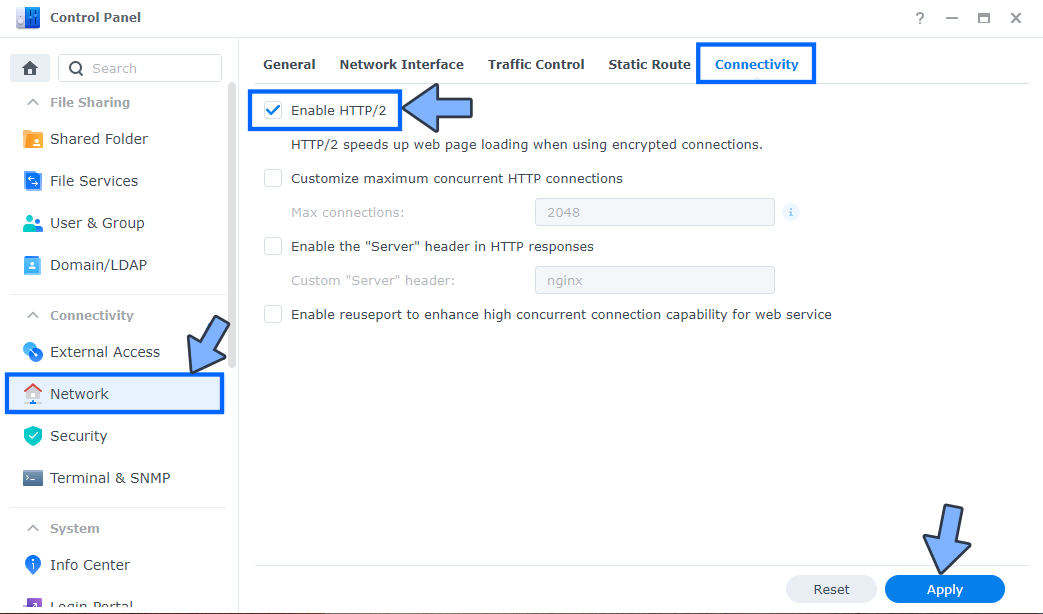
STEP 9
Go to Control Panel / Security / Advanced tab/ Check Enable HTTP Compression then click Apply. Follow the instructions in the image below.
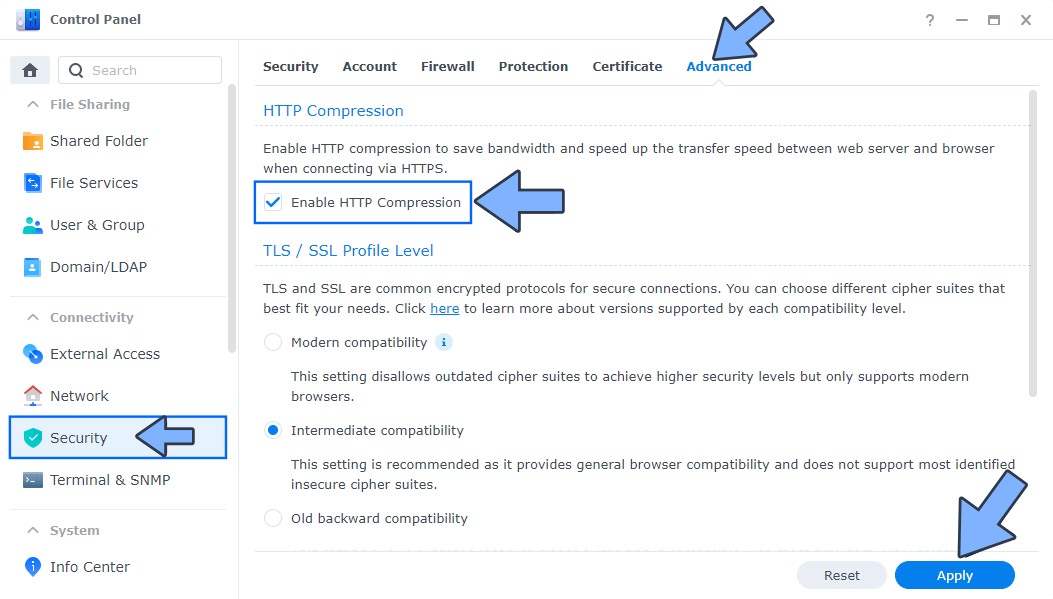
STEP 10
Go to File Station and open the docker folder. Inside the docker folder, create one new folder and name it chibisafe. Follow the instructions in the image below.
Note: Be careful to enter only lowercase, not uppercase letters.
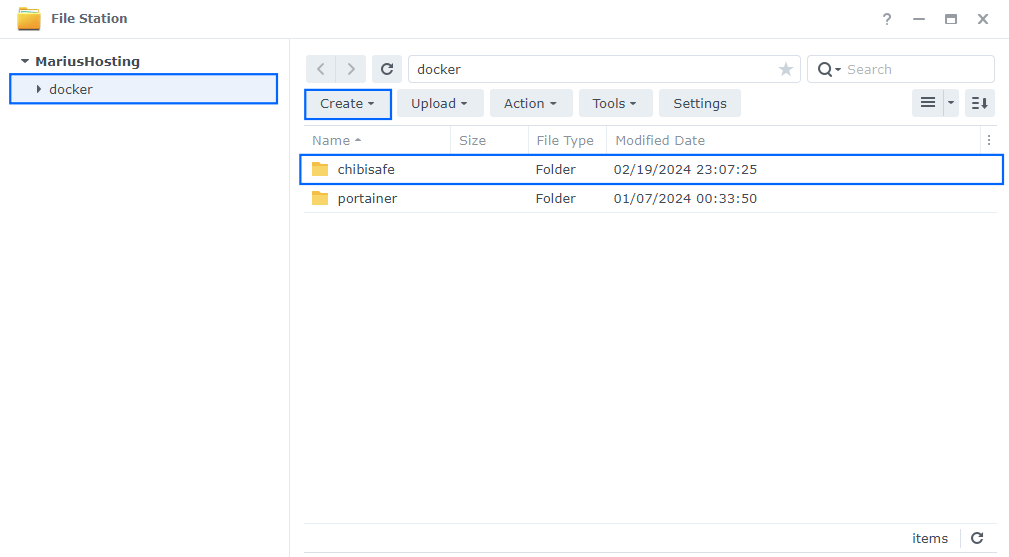
STEP 11
Now create three new folders inside the chibisafe folder that you created at STEP 10 and name them caddy, db, logs, uploads. Follow the instructions in the image below.
Note: Be careful to enter only lowercase, not uppercase letters.
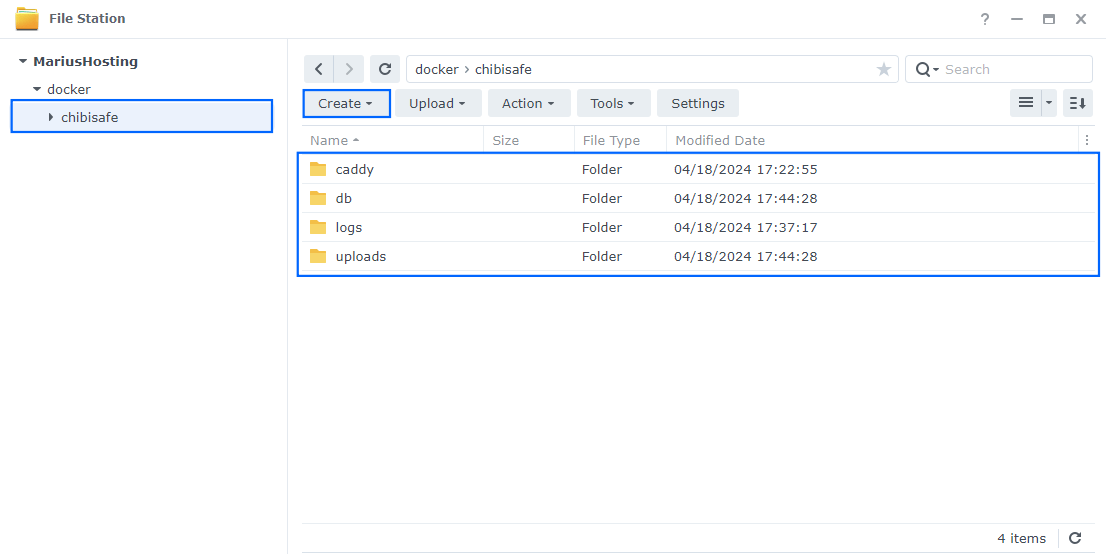
STEP 12
Download (click on the blue link below) and upload the Caddyfile.txt file below in the caddy folder that you have previously created at STEP 11. Follow the instructions in the image below. 🔒Note: Support my work to unlock the password. You can use this password to download any file on mariushosting forever!
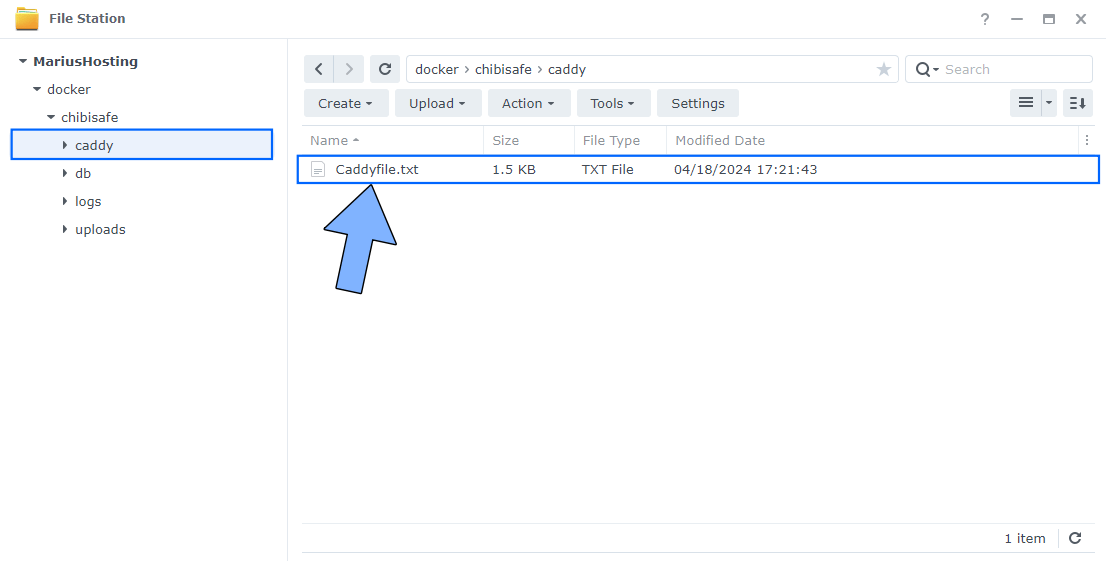
STEP 13
Log into Portainer using your username and password. On the left sidebar in Portainer, click on Stacks then + Add stack. Follow the instructions in the image below.
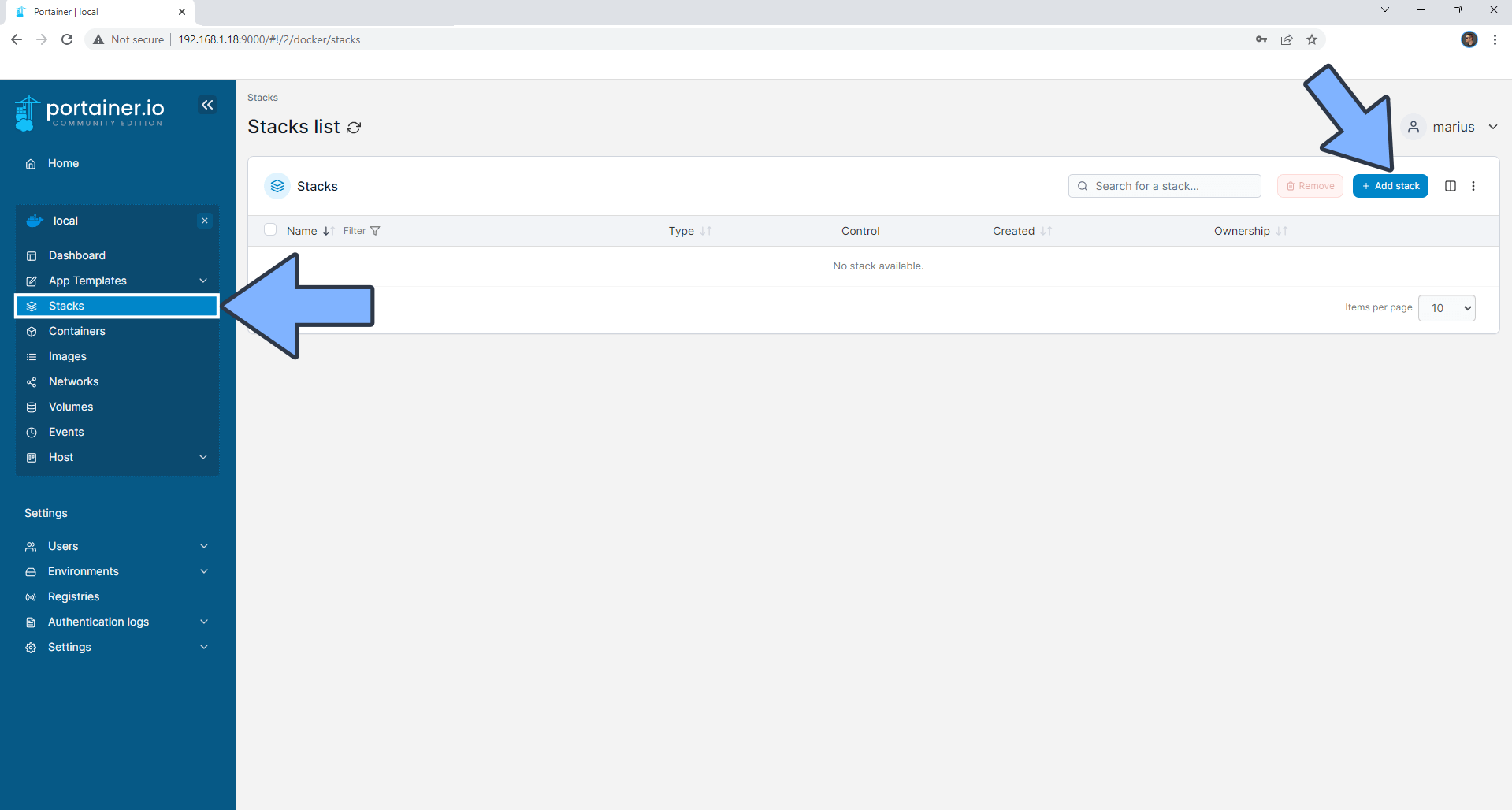
STEP 14
In the Name field type in chibisafe. Follow the instructions in the image below.
services:
chibisafe:
image: chibisafe/chibisafe:latest
container_name: Chibisafe-FRONT
environment:
- BASE_API_URL=http://chibisafe_server:8000
expose:
- 8001
restart: on-failure:5
chibisafe_server:
image: chibisafe/chibisafe-server:latest
container_name: Chibisafe-SERVER
volumes:
- /volume1/docker/chibisafe/db:/app/database:rw
- /volume1/docker/chibisafe/uploads:/app/uploads:rw
- /volume1/docker/chibisafe/logs:/app/logs:rw
expose:
- 8000
restart: on-failure:5
caddy:
image: caddy:2-alpine
container_name: Chibisafe-CADDY
volumes:
- /volume1/docker/chibisafe/caddy/Caddyfile.txt:/etc/caddy/Caddyfile:ro
- /volume1/docker/chibisafe/uploads:/app/uploads:ro
ports:
- 2425:80
environment:
- BASE_URL=":80"
restart: on-failure:5
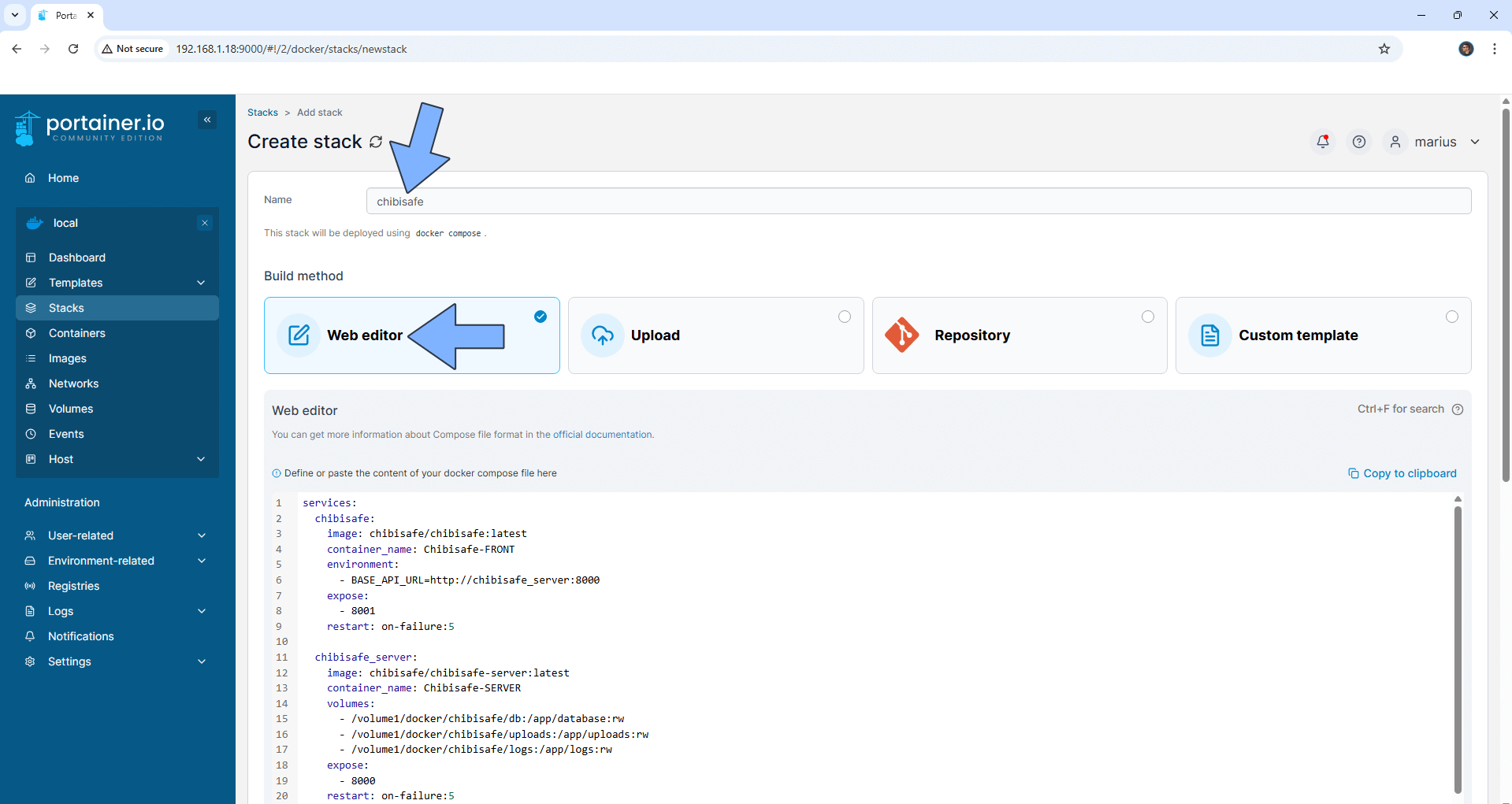
STEP 15
Scroll down on the page until you see a button called Deploy the stack. Click on it. Follow the instructions in the image below. The installation process can take up to a few minutes. It will depend on your Internet speed connection.
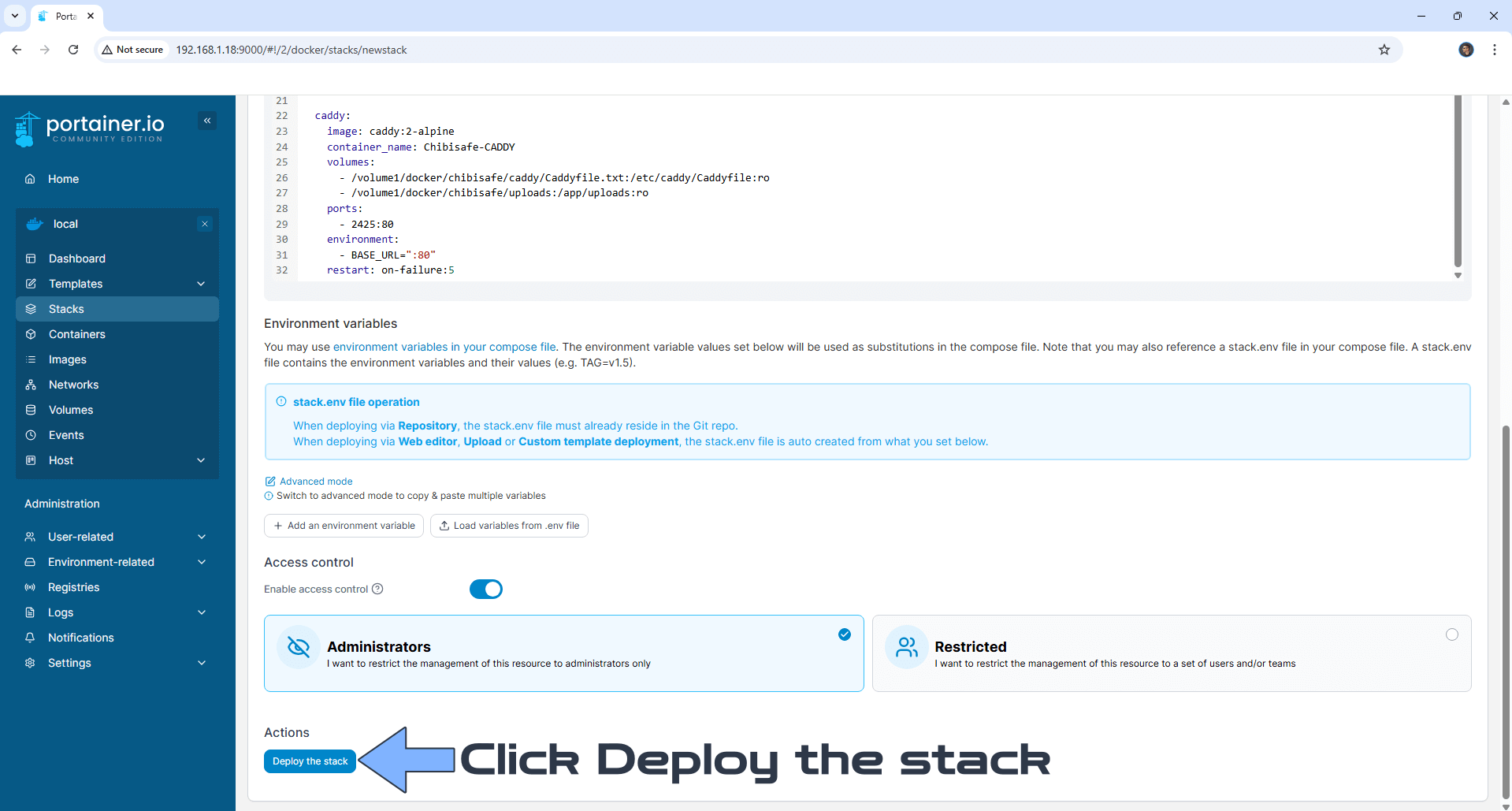
STEP 16
If everything goes right, you will see this message at the top right of your screen: “Success Stack successfully deployed“.
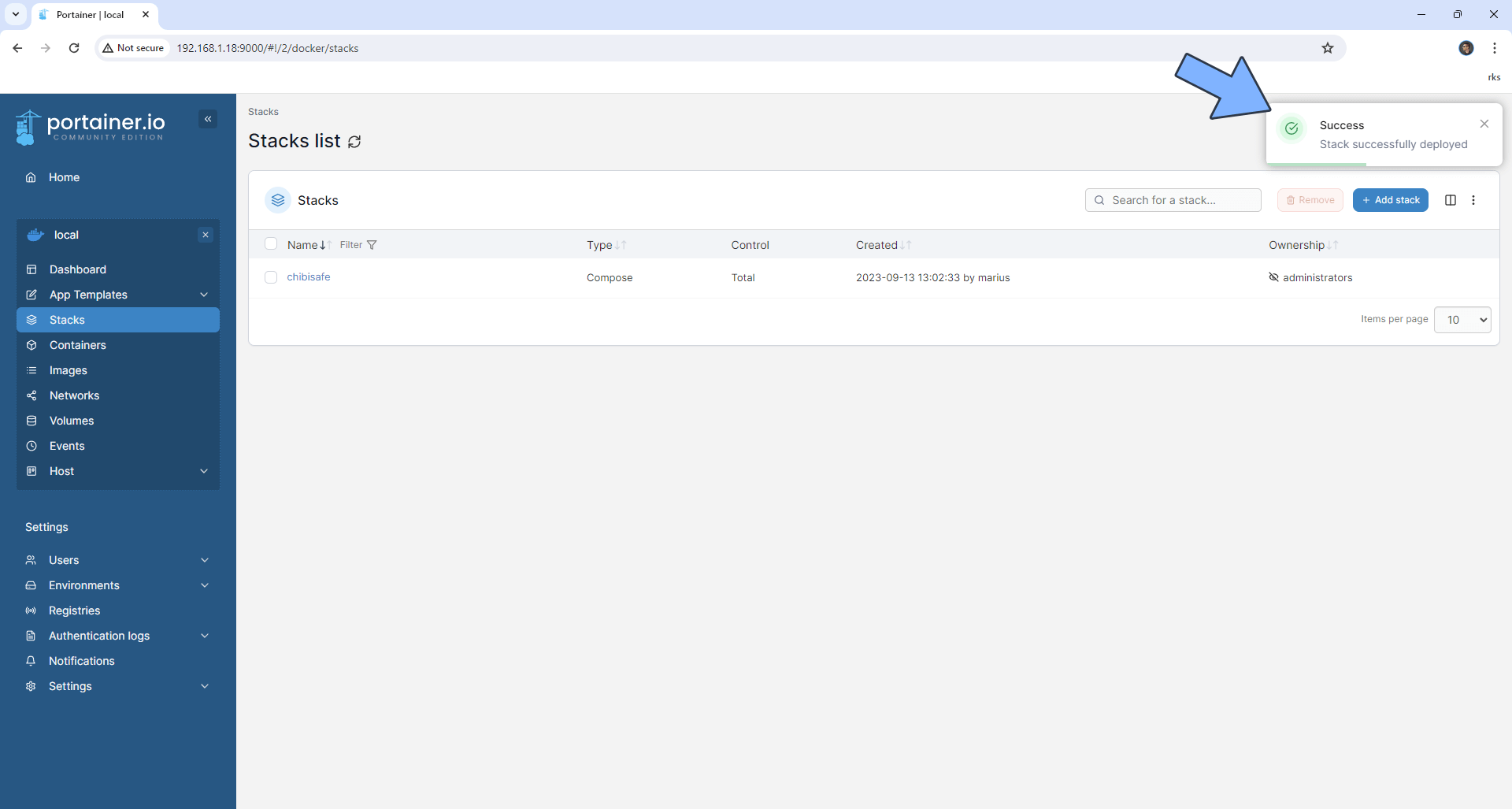
STEP 17
🟢Please Support My work by Making a Donation. Almost 99,9% of the people that install something using my guides forget to support my work, or just ignore STEP 1. I’ve been very honest about this aspect of my work since the beginning: I don’t run any ADS, I don’t require subscriptions, paid or otherwise, I don’t collect IPs, emails, and I don’t have any referral links from Amazon or other merchants. I also don’t have any POP-UPs or COOKIES. I have repeatedly been told over the years how much I have contributed to the community. It’s something I love doing and have been honest about my passion since the beginning. But I also Need The Community to Support me Back to be able to continue doing this work.
STEP 18
Now open your browser and type in your HTTPS/SSL certificate like this https://chibisafe.yourname.synology.me In my case it’s https://chibisafe.mariushosting.synology.me If everything goes right, you will see the Chibisafe Login Page. At the top of the page, click Login. Follow the instructions in the image below.
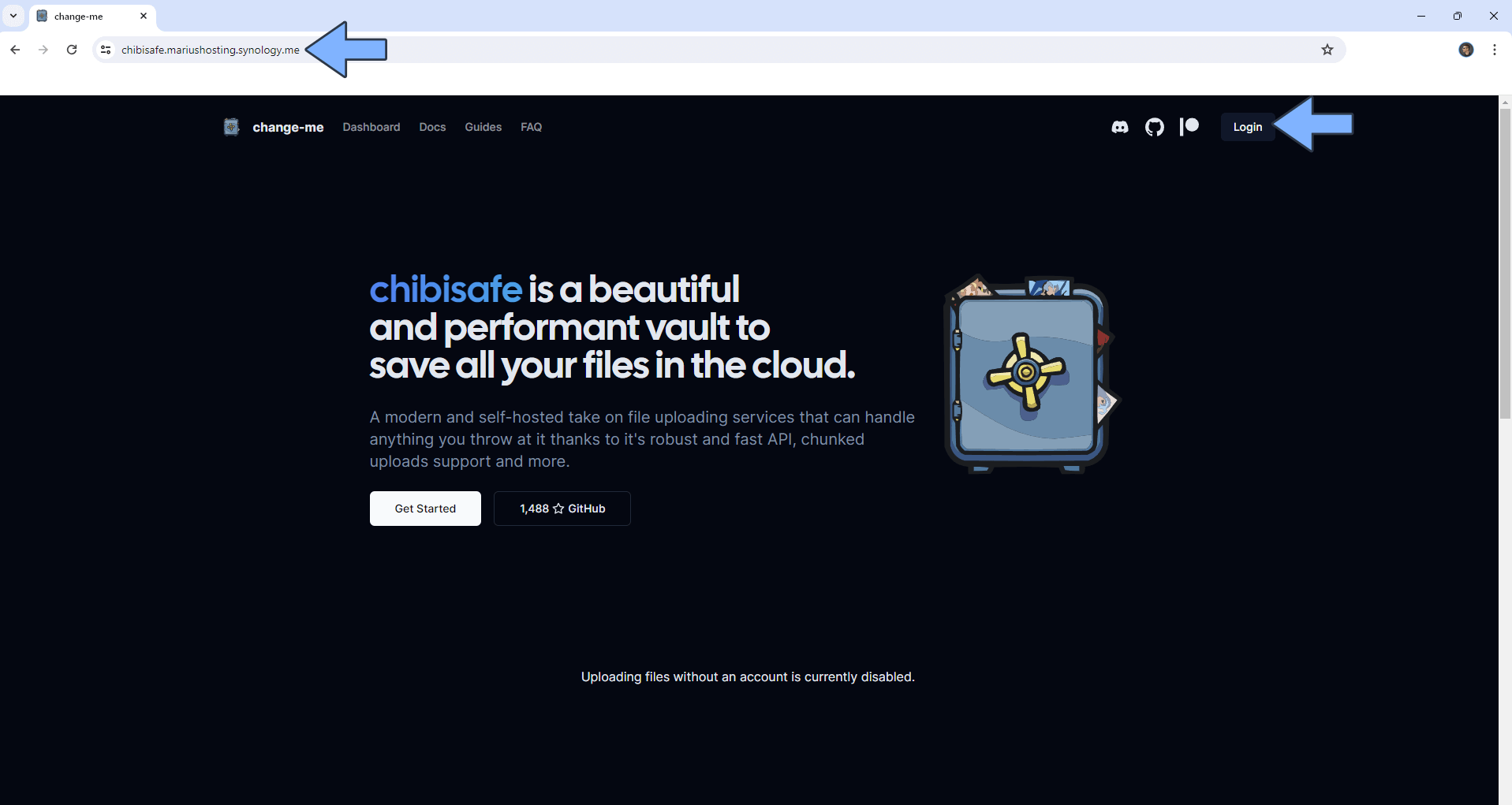
STEP 19
Type in the default Username and Password, then click Sign In. Follow the instructions in the image below.
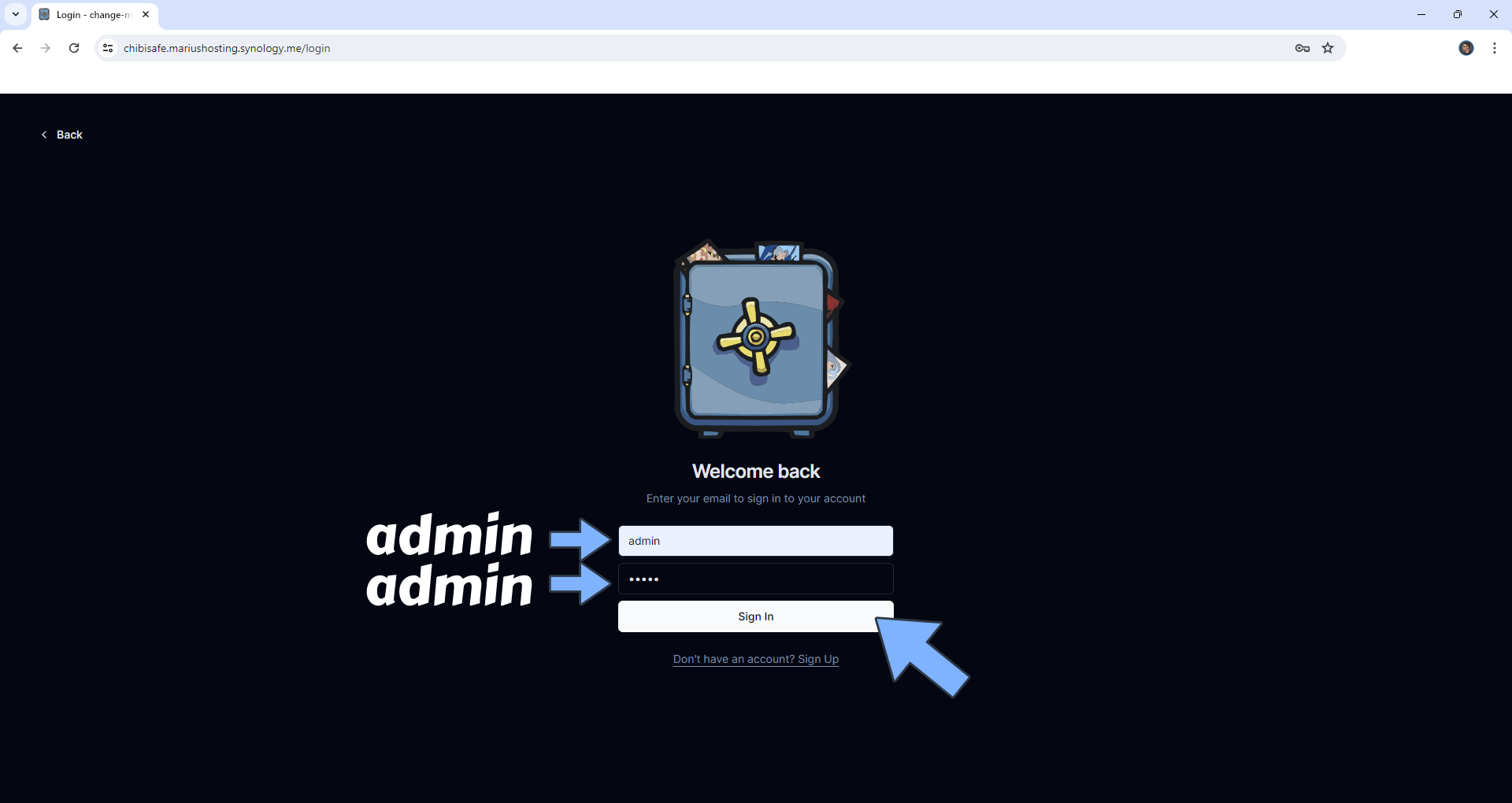
STEP 20
Click the Serve uploads link in the brown banner. Follow the instructions in the image below.
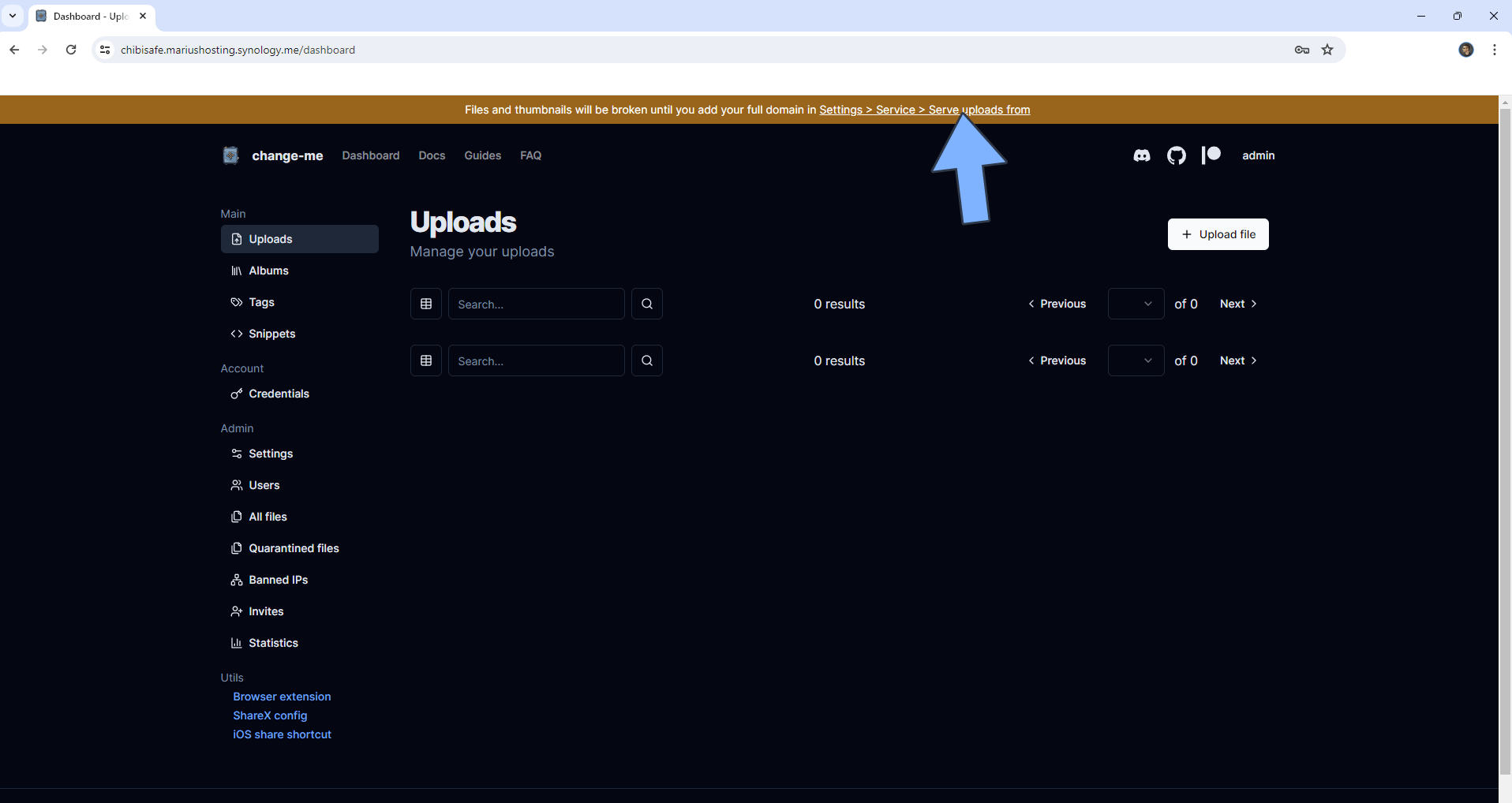
STEP 21
Click the Service tab, then type in your synology.me DDNS with https:// at the beginning that you have previously created at STEP 6 in the Serve Uploads From area. Follow the instructions in the image below.
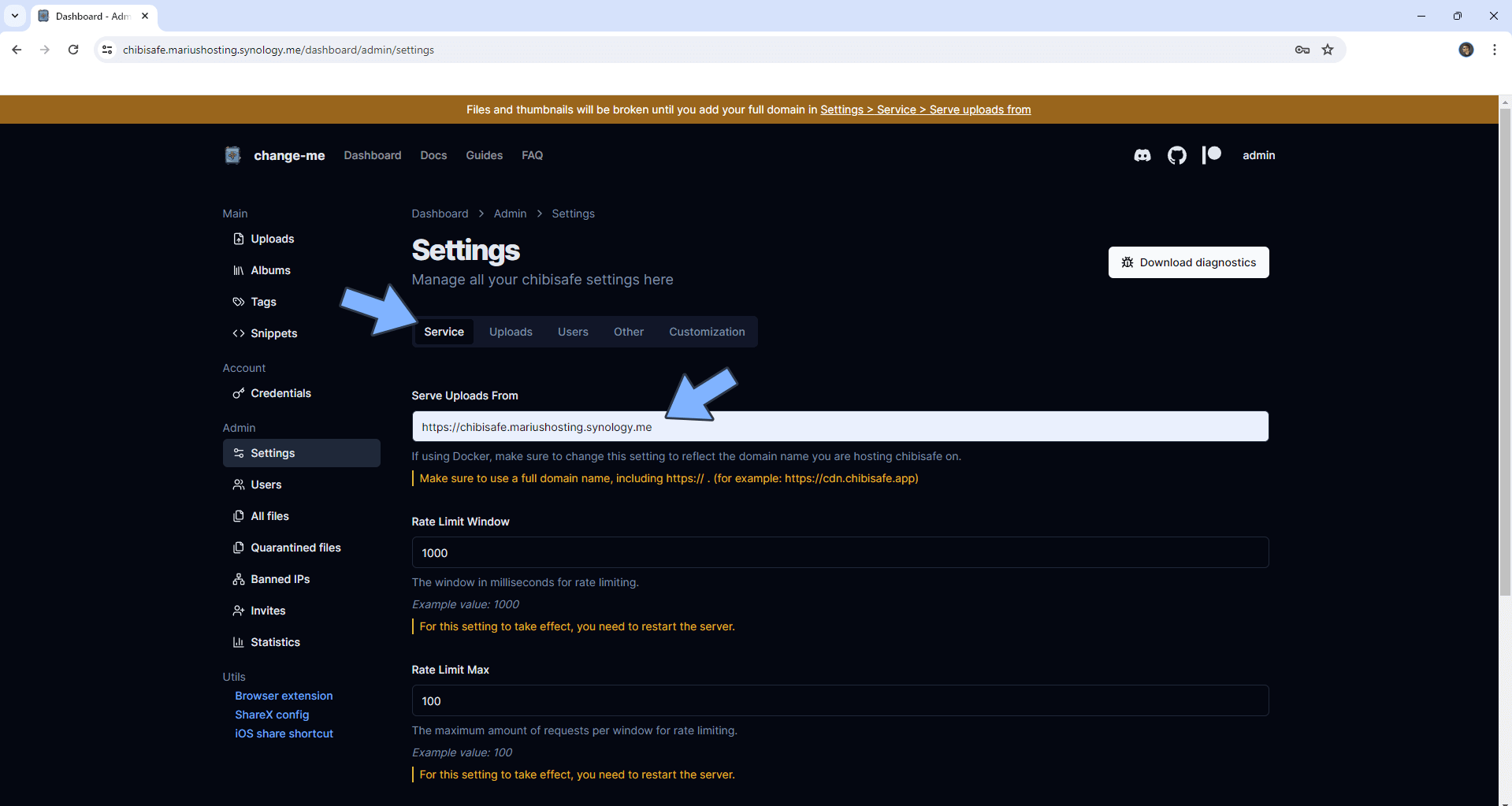
STEP 22
Scroll down the page, then hit the Save settings button. Follow the instructions in the image below.
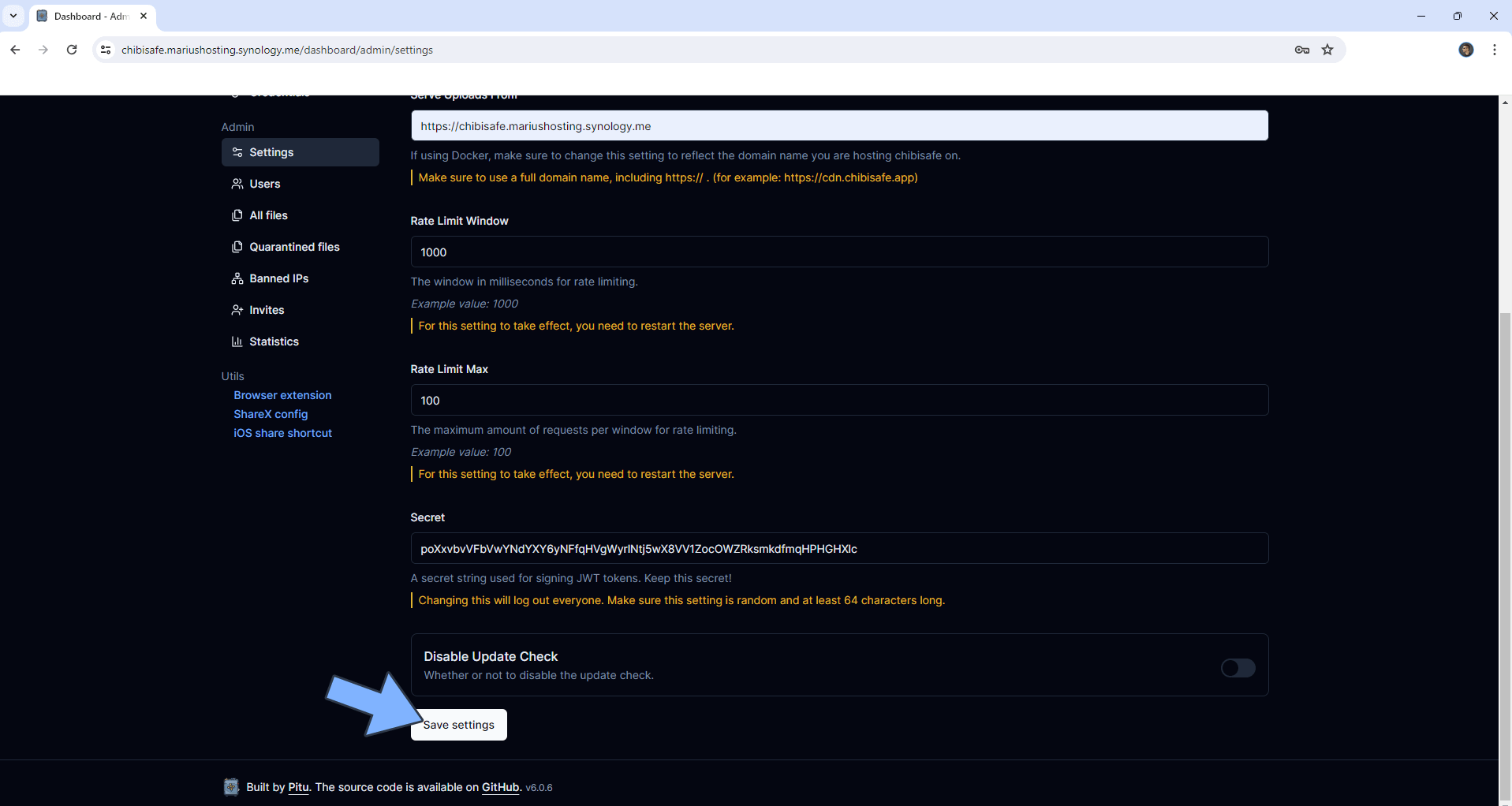
STEP 23
On the left sidebar, click Credentials. Change the Chibisafe default admin password with your own password, then click Change password. Follow the instructions in the image below.
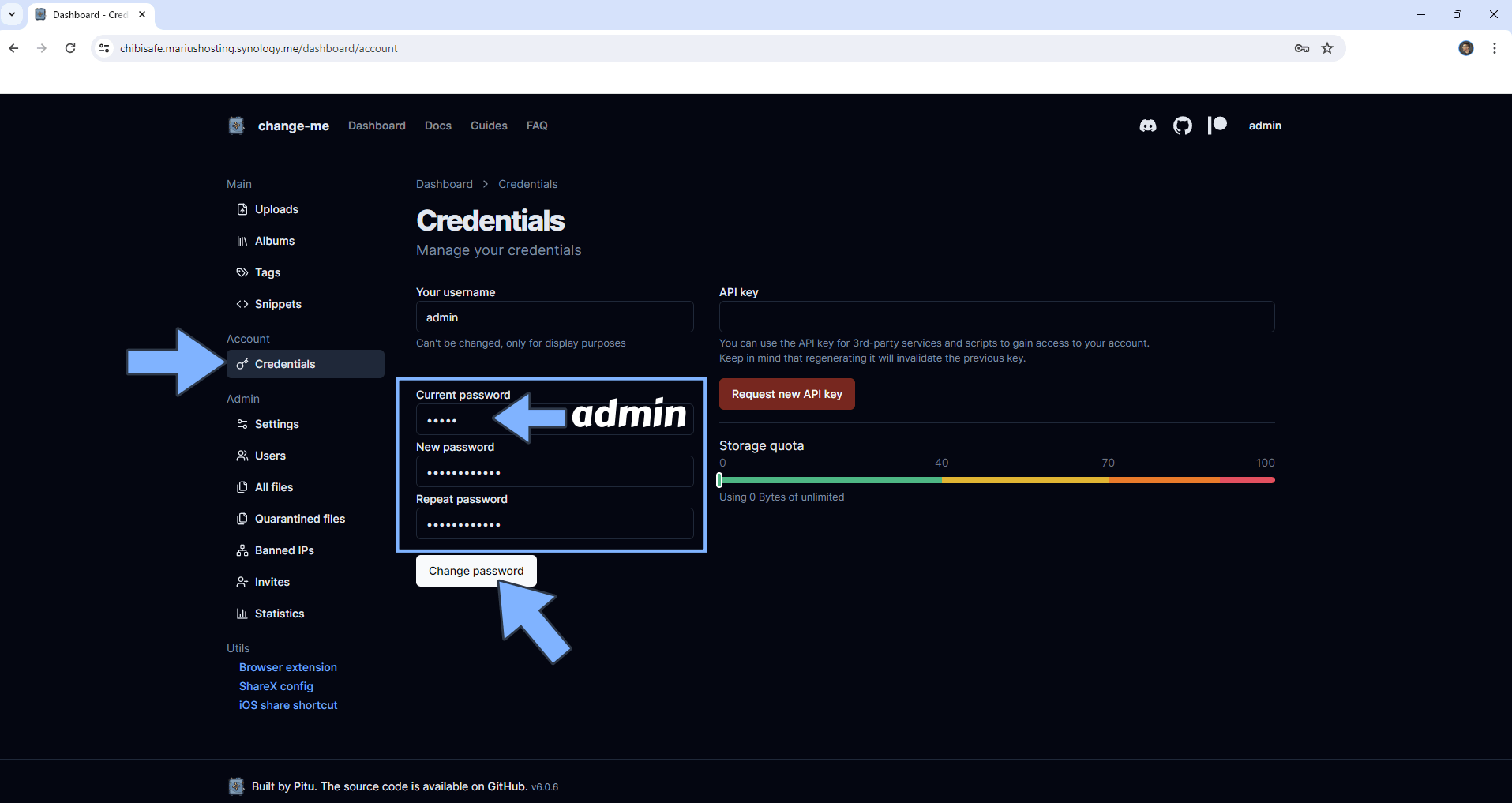
STEP 24
On the left sidebar, click Settings, then click the Customization tab. Type in your own Service Name instance, the Background Image URL, the Logo URL and the Meta description. Follow the instructions in the image below.
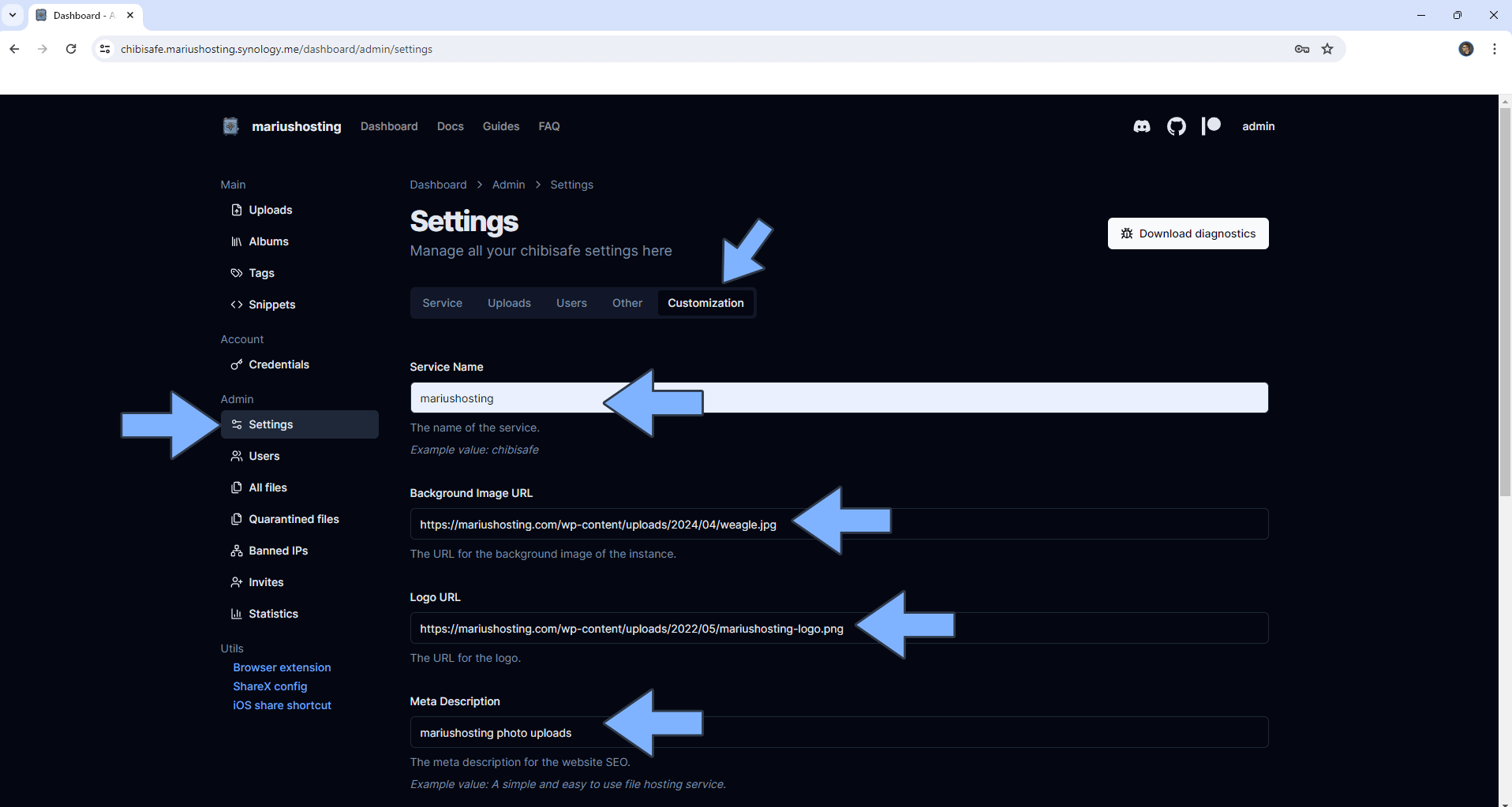
STEP 25
Select Use Minimal Homepage, then hit the Save settings button. Follow the instructions in the image below.
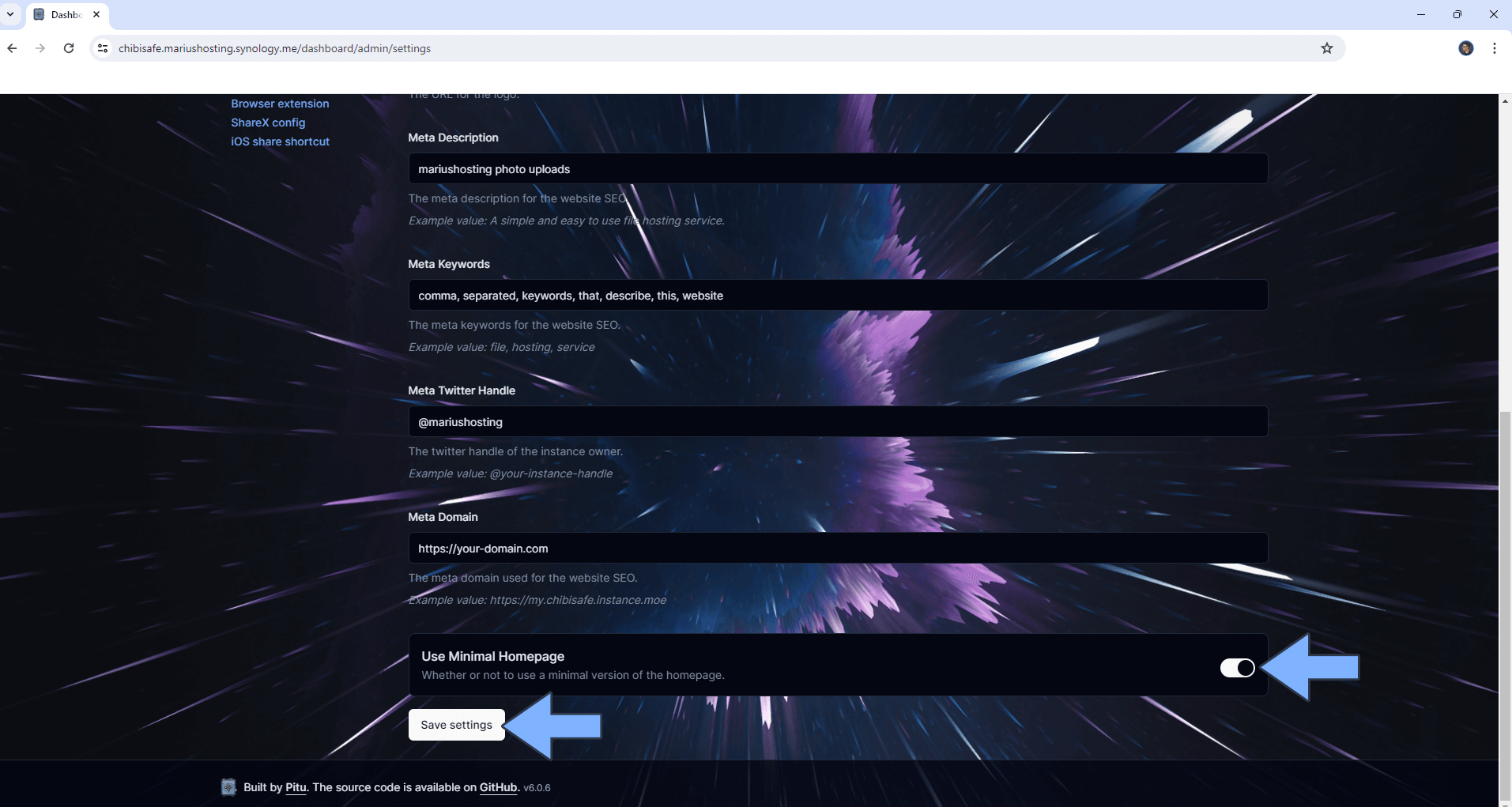
STEP 26
Start uploading your own files by clicking the drop files rectangle. Follow the instructions in the image below.
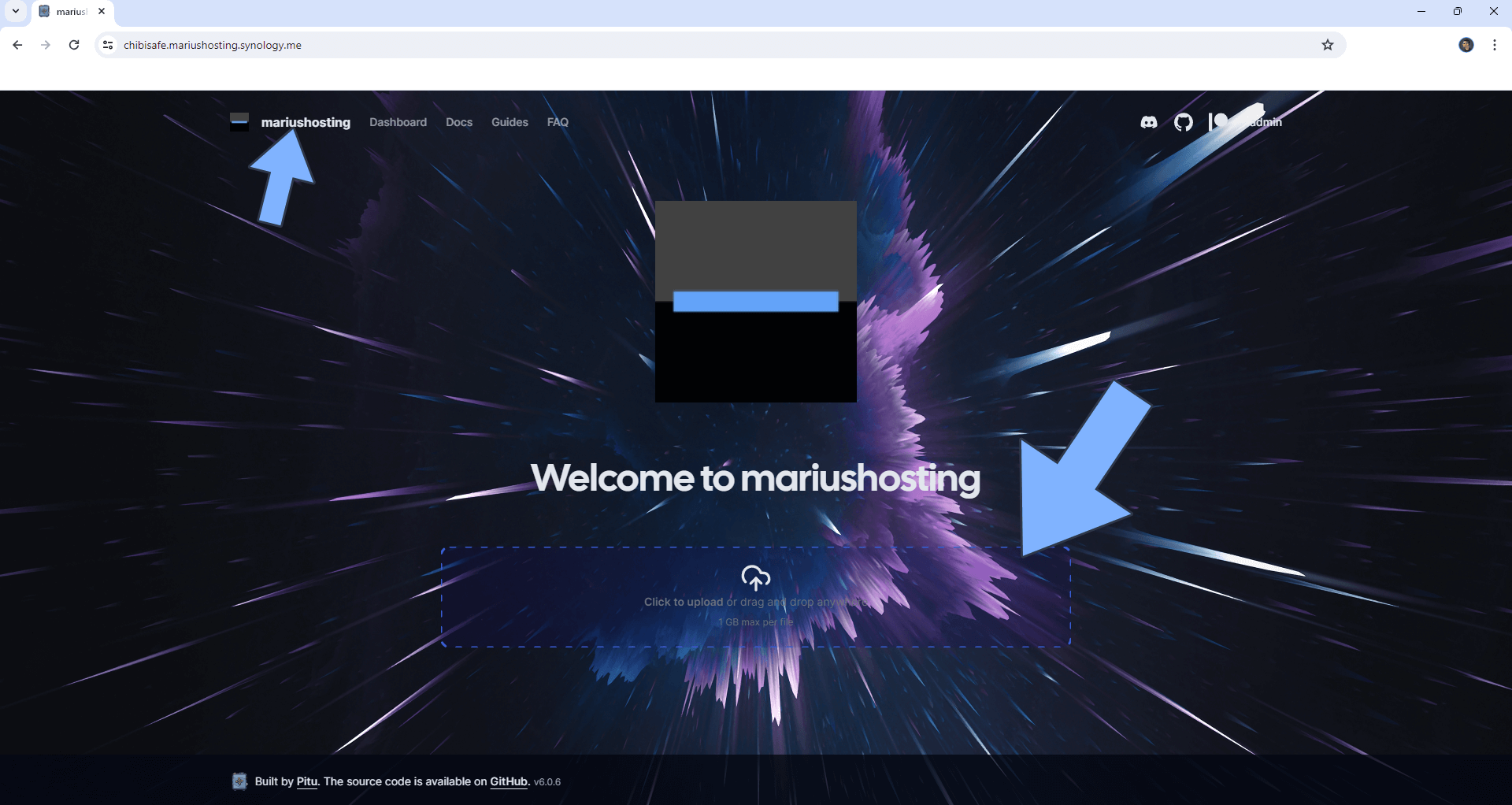
STEP 27
Your uploaded files at a glance. Click on a file. Follow the instructions in the image below.
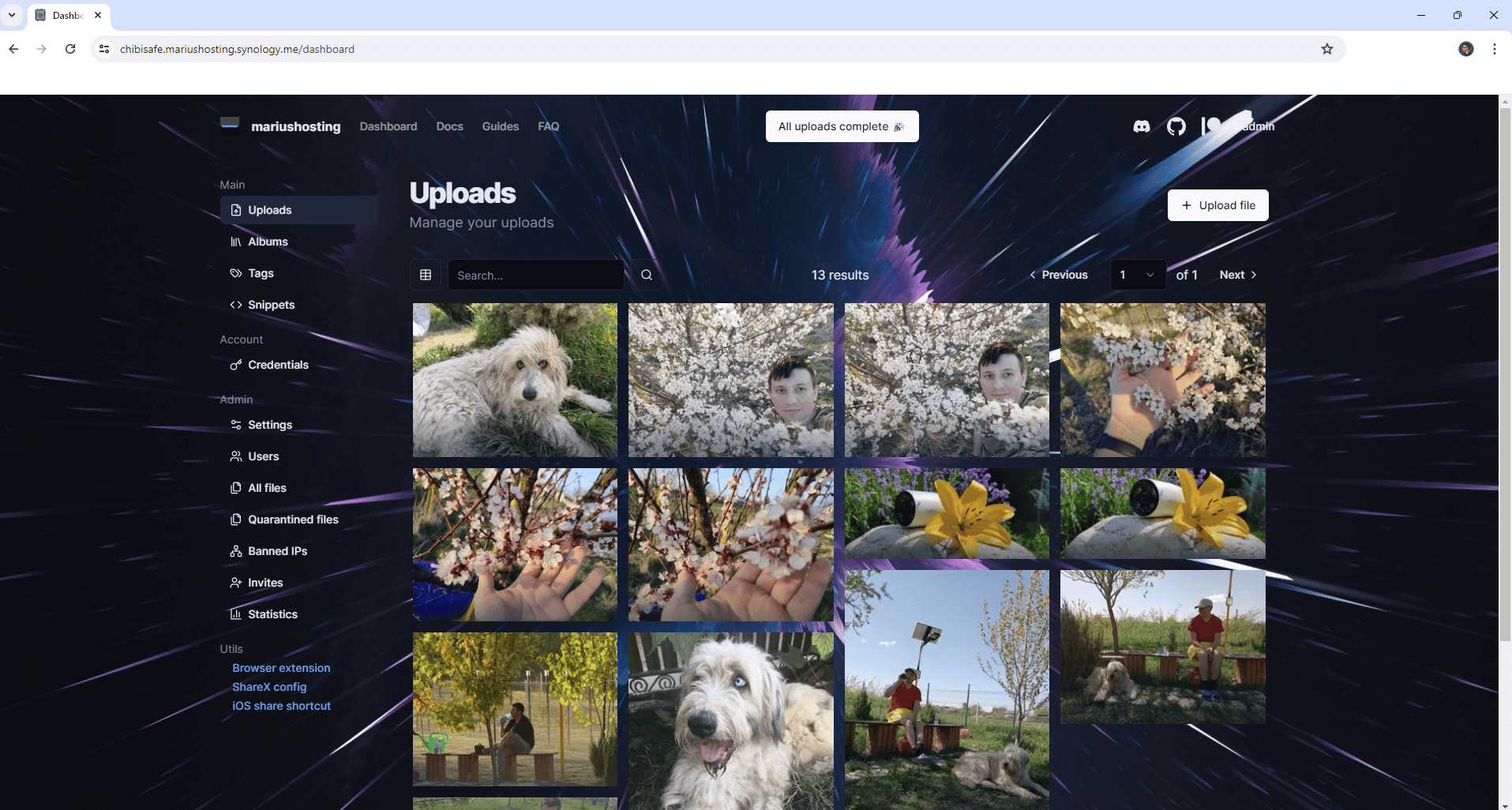
STEP 28
You can share your favorite files online with your friends or family. Follow the instructions in the image below.
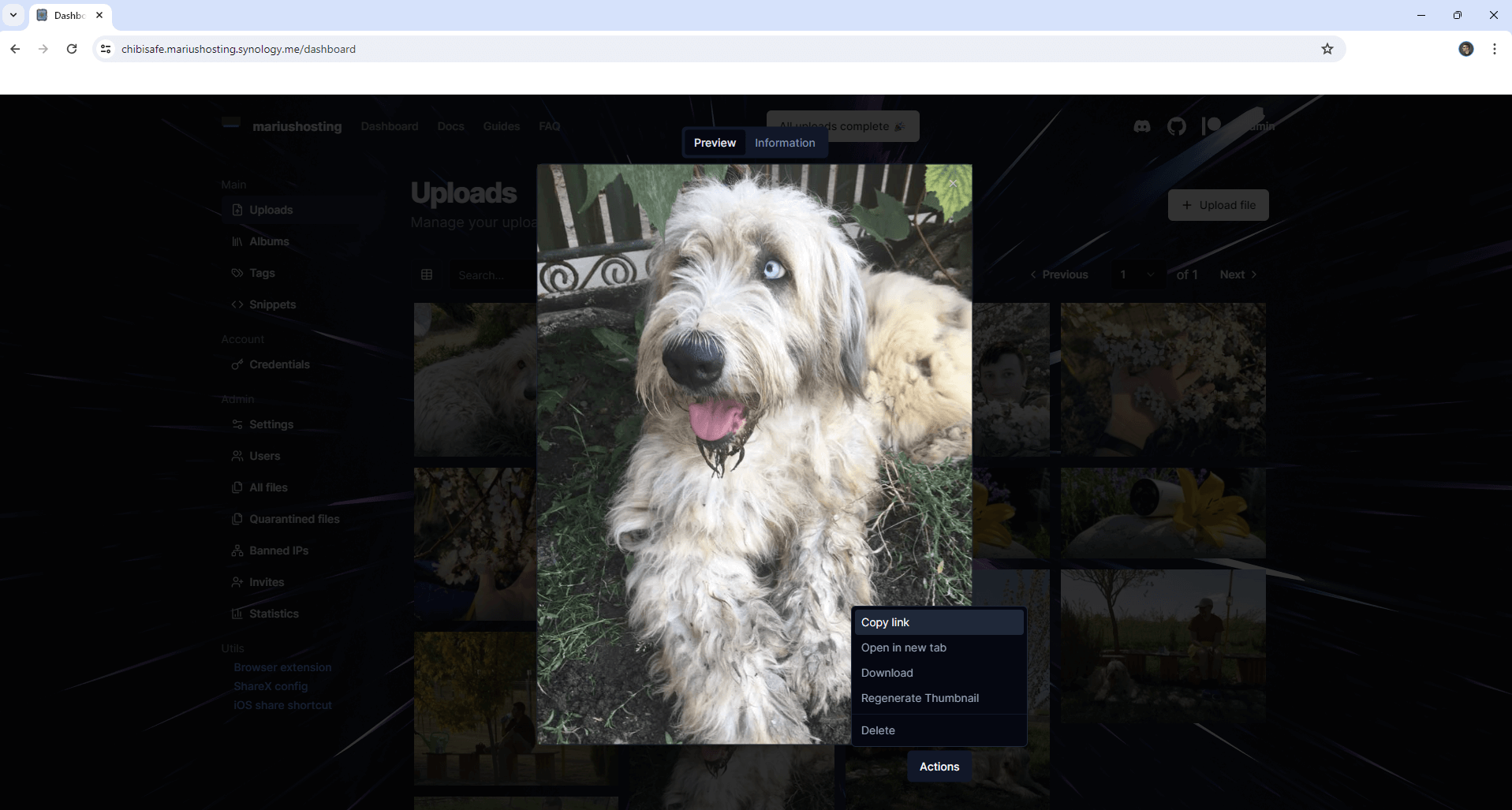
Enjoy Chibisafe!
If you encounter issues by using this container, make sure to check out the Common Docker issues article.
Note: Can I run Docker on my Synology NAS? See the supported models.
Note: How to Back Up Docker Containers on your Synology NAS.
Note: Find out how to update the Chibisafe container with the latest image.
Note: How to Free Disk Space on Your NAS if You Run Docker.
Note: How to Schedule Start & Stop For Docker Containers.
Note: How to Activate Email Notifications.
Note: How to Add Access Control Profile on Your NAS.
Note: How to Change Docker Containers Restart Policy.
Note: How to Use Docker Containers With VPN.
Note: Convert Docker Run Into Docker Compose.
Note: How to Clean Docker.
Note: How to Clean Docker Automatically.
Note: Best Practices When Using Docker and DDNS.
Note: Some Docker Containers Need WebSocket.
Note: Find out the Best NAS Models For Docker.
Note: Activate Gmail SMTP For Docker Containers.
This post was updated on Monday / June 16th, 2025 at 6:50 AM
